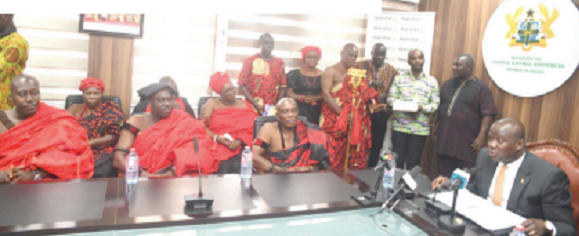
Support government to protect natural resources - Abu Jinapor appeals to chiefs
The Minister of Lands and Natural Resources, Samuel Abu Jinapor, has called for the unflinching support of chiefs and traditional rulers to help deal with the challenges confronting effective land administration and exploitation of the country’s mineral resources.
He said the hydra-headed challenges required the active involvement of chiefs to stem the tide. Fortunately, the minister said, the unique leadership position chiefs occupied at the local level made them indispensable in the implementation of policies to protect natural resources.
Courtesy call
Mr Jinapor made the call when a delegation of the chiefs and the people of the Gbi Traditional Area in the Volta Region paid a courtesy call on him yesterday. The purpose of the visit was to formally introduce the new Paramount Chief of the Gbi Traditional Area, Togbega Gabusu VII, to the minister.
Known in private life as Seth Kodzo Agbesinyale, Togbega Gabusu VII succeeded Togbega Gabusu VI, who was laid to rest in November 2021 after reigning for 29 years as the sixth traditional ruler of the Gbi Traditional Area.
Support
The minister assured Togbega Gabusu VII that he would work closely with him and other chiefs to effectively manage the country’s natural resources.
“Without the support of chiefs and traditional rulers, the work of the Ministry of Lands and Natural Resources and its agencies will be meaningless, so we need your support,” Mr Jinapor said. He commended the kingmakers and people of the Gbi Traditional Area for going through a peaceful process to settle on the new traditional leader.
“We are aware of the disturbances and rancour that characterise the selection of chiefs, especially for important traditional areas such as Gbi,” he said.
Assurance
For his part, the Spokesperson for Togbega Gabusu, Keh XII, commended the Lands and Natural Resources Minister for the part he played during the burial rites of the late paramount chief of the the Gbi Traditional Area.
He assured the minister of the support of the people of Gbi Traditional Area, adding that a stronger collaboration between traditional rulers and the government was the best way forward.
Forest carbon blueprint
In another development, Mr Jinapor has told Parliament that the ministry will work with relevant agencies to develop a blueprint for forest carbon transactions to support the carbon market, Nana Konadu Agyeman and Charleselta Abaidoo report from Parliament House.
Mr Jinapor said having a properly regulated carbon market would position the country to benefi t economically from the lucrative new market, which grew to $851 billion last year.
“Ghana is one of the few countries building end-to-end state-of-theart digital infrastructure to support its participation in international carbon markets,” he said.
Presenting a policy statement on the development of Ghana’s carbon market in Parliament yesterday, Mr Jinapor said: “We will continue to work with that of the Ministry of Environment, Science, Technology and Innovation to develop a comprehensive Carbon Market and Trade Policy for our country.
“A domestic framework that allows the approval and registration of mitigation initiatives is necessary for participation in the market-based and non-market cooperation approaches of Article 6 of the Paris Agreement,” he stated.
What’s carbon stock?
Carbon stocks refer to the amount of carbon stored on earth, in oceans, rocks, fossil fuels and forests. The higher the forests’ capacity to absorb and sequester carbon dioxide (CO2), the higher the carbon stock, thereby limiting greenhouse gas emissions in the atmosphere.
Ad hoc approaches
The minister said some companies in the country had already taken advantage of the carbon market to enter into unverified carbon claims and transactions within their supply chains.
In the absence of a well coordinated policy and institutional framework, those involved in that trade were adopting ad hoc and need-based approaches, he said.
“To capitalise on opportunities in the global carbon market, we must strengthen our institutional capacities and develop an authorisation process for international transfers,” Mr Jinapor stated.
He said forestry and land use climate-related projects had seen very substantial funding investments, such as through the Forest Investment Programme (FIP) and the Reducing Emissions from Deforestation and Forest Degradation (REDD+) programme.
The programme, he said, had two huge landmark programmes in the Cocoa-Forest and Shea-Savannah Landscapes, with funding support from the Carbon Fund, and the Green Climate Fund, respectively.
